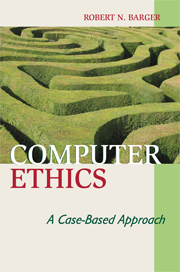Book contents
- Frontmatter
- Contents
- Preface
- Acknowledgments
- 1 Introduction
- 2 The Computer as a Humanizing Agent
- 3 Philosophic Belief Systems
- 4 A Philosophic Inventory
- 5 The Possibility of a Unifying Ethical Theory
- 6 The Ethical Decision-Making Process
- 7 Psychology and Computer Ethics
- 8 The Computing Field as a Profession
- 9 Computer-Related Codes of Ethics
- 10 Computer Ethics and International Development
- 11 Robotics and Ethics
- 12 Theft and Piracy Concerns
- 13 Cases Concerning Theft and Piracy
- 14 Privacy Concerns
- 15 Cases Concerning Privacy
- 16 Power Concerns
- 17 Cases Concerning Power
- 18 A Miscellaneous Collection of Cases
- 19 Parasitic Computing Case
- Appendix: Topics for Presentations, Discussions, and Papers
- Notes
- Selected Bibliography
- Index
5 - The Possibility of a Unifying Ethical Theory
Published online by Cambridge University Press: 05 June 2012
- Frontmatter
- Contents
- Preface
- Acknowledgments
- 1 Introduction
- 2 The Computer as a Humanizing Agent
- 3 Philosophic Belief Systems
- 4 A Philosophic Inventory
- 5 The Possibility of a Unifying Ethical Theory
- 6 The Ethical Decision-Making Process
- 7 Psychology and Computer Ethics
- 8 The Computing Field as a Profession
- 9 Computer-Related Codes of Ethics
- 10 Computer Ethics and International Development
- 11 Robotics and Ethics
- 12 Theft and Piracy Concerns
- 13 Cases Concerning Theft and Piracy
- 14 Privacy Concerns
- 15 Cases Concerning Privacy
- 16 Power Concerns
- 17 Cases Concerning Power
- 18 A Miscellaneous Collection of Cases
- 19 Parasitic Computing Case
- Appendix: Topics for Presentations, Discussions, and Papers
- Notes
- Selected Bibliography
- Index
Summary
Introduction
In Chapter 3 on Philosophic Belief Systems, it was mentioned that people of different philosophic viewpoints might agree on a common solution to an ethical dilemma. They would, however, do so for different reasons. Let us recall the outlooks of the four basic philosophies. The Idealist believes that reality lies ultimately in the ideal, nonmaterial dimension and so goodness would involve conformity to the ideal. The Realist believes that reality is found in nature and so goodness involves acting in accord with what is natural. The Pragmatist believes that reality is not an idea or a thing but rather an ongoing experience (i.e., the flow of life) and so goodness is concerned with the production of socially desirable results. The Existentialist believes that reality is self-defined and so goodness is concerned with whatever one's own conscience dictates.
To illustrate, let us take the case of murder. The Idealist would say that murder is wrong because all life is sacred. The Realist would say that murder is wrong because people should die only of natural causes. The Pragmatist would say that murder is wrong because it is disruptive of the good of society. The Existentialist would say that murder is wrong simply because the Existentialist believes it is wrong (probably out of respect for other people's autonomy and integrity).
Information
- Type
- Chapter
- Information
- Computer EthicsA Case-based Approach, pp. 65 - 69Publisher: Cambridge University PressPrint publication year: 2008
